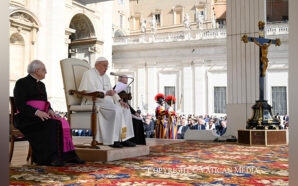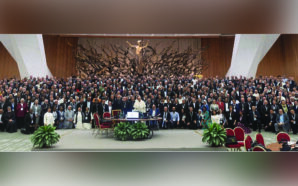The curriculum we use to educate our children about their faith in our schools is built around ‘pillars’ of our Catholic Tradition. Grace is one such pillar which is particularly apparent during Lent and Easter. Here’s how we can think about grace at this time.
During Lent and Easter, as Christians we are particularly mindful of the liberation granted to us by Christ’s death and resurrection. We can also call this liberation by another name – grace.
Easter is the ‘moment’ of grace in the life of the Church. As we read in the Bible, “This is the day that the Lord has made, let us rejoice and be glad” (Psalm 118:24).
It is not easy to understand grace, perhaps we don’t even try. Most people might consider grace to be a short prayer said before meals, but there is more to grace than meets the eye. Indeed, grace is most usually described as a mystery.
In the New Testament, grace is understood as the goodwill of God, a beatitude or blessedness that produces the virtues of faith, hope and love. St Paul taught that grace is “God’s love poured into our hearts” (Romans 5:5).
The great prayer of the Church, the Magnificat, tells of God’s love for all of his people. And the ancient song in Luke (1:46-55), tells of the greeting of Mary by the Angel Gabriel. “Hail (Mary) full of Grace! The Lord is with thee and blessed art thou amongst women and blessed is the fruit of your womb.”
“Hail” literally means, “rejoice” or be “glad,” for you are blessed with God’s grace.
Perhaps the most important thing to understand about grace is that it doesn’t have to be earned. Grace is a free gift from God to all of humanity – because we are all loved by God. Pope Francis teaches: “We need to acknowledge jubilantly that our life is essentially a gift, and recognise that our freedom is a grace. This is not easy today, in a world that thinks it can keep everything for itself” (Gaudete et Exsultate, 5).
Grace bestows the light of God onto a given person or situation; one can speak of being moved by God’s grace. Perhaps the opposite of grace might be understood as dis-grace?
Grace is discovered in ordinary life, in prayer, especially when we discern the voice of God. Grace is uncovered in the gentleness of accepting God’s will.
This Easter time, as a community of faith, we draw deeply upon God’s grace – the grace that is Easter.
God’s gift of grace can be found in ordinary life – like a crowded kitchen table at Easter with family and friends.
May you all have a holy, happy and blessed Easter.
Professor Anthony Maher is Consultant Theologian to Catholic Education Diocese of Parramatta.
This article was originally featured in the Lent and Easter/Autumn 2021 Edition of the Catholic Outlook Magazine.








